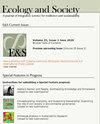寻找隐藏的联系来探索文化景观系统的适应能力——德国四个土地保护协会的案例研究
IF 3.2
2区 社会学
Q1 ECOLOGY
引用次数: 1
摘要
适应能力是指在复杂的社会生态系统中应对和适应扰动的能力。文化景观可以理解为这样的系统,它们面临着土地废弃和农业集约化的关键干扰。然而,到目前为止,还没有从适应能力的角度对这种文化景观损失的应对措施进行系统的研究。本研究以这一差距为出发点,采用上下文敏感的方法,解决了一个问题:如何理解文化景观系统对土地废弃等干扰的适应能力?我们通过对德国四个土地保护协会的比较案例研究来回答这个问题。使用了一个概念框架,区分应对和适应反应,并允许分析反应的不同适合程度。四个协会将废弃农业用地的管理、文化景观特色的建立、咨询和调解服务的提供以及机制作为应对措施。适应措施包括组织活动、公共关系工作、教育、区域品牌推广、游说工作和区域产品推广。确定了具有协同或反作用的反应之间的相互作用。这项研究的结果强调,除了单独投资于应对和适应反应外,不同反应之间的匹配是理解文化景观系统适应能力的一个重要因素。从这个意义上说,适应能力不仅需要从应对(短期适应能力)和适应反应(长期适应能力)的角度来理解,还需要通过良好的适应来理解,这减少了反应之间的权衡,从而提供了更广泛的未来选择。最后,我们呼吁对扰动的不同反应进行全面分析,并考虑其适合性。本文章由计算机程序翻译,如有差异,请以英文原文为准。
Looking at hidden connections to explore adaptive capacity of cultural landscape systems: case studies of four landcare associations in Germany
Adaptive capacity indicates the capacity to cope with and adapt to a disturbance in a complex social-ecological system. Cultural landscapes can be understood as such systems that are confronted with land abandonment and agricultural intensification as key disturbances. However, responses to such cultural landscape loss have not been systematically investigated so far in terms of adaptive capacity. Taking this gap as a starting point and following a context-sensitive approach, this study addresses the question: how can the adaptive capacity of cultural landscape systems for a disturbance such as land abandonment be understood? We answer this question through a comparative case study of four landcare associations in Germany. A conceptual framework that distinguishes between coping and adaptation responses and allows for the analysis of different levels of fit of responses is used. Management of abandoned agricultural land, the establishment of cultural landscape features, provision of consultation and mediation services, and machinery are implemented as coping responses by the four associations. Adaptation responses include the organization of events, public relations work, education, regional brand promotion, lobbying work, and the promotion of regional products. The interactions between the responses that have either synergetic or counterproductive effects were identified. The results of this study emphasize the fit between different responses as an important factor for understanding the adaptive capacity of cultural landscape systems in addition to investing in coping and adaptation responses in isolation. In this sense, adaptive capacity needs to be understood not only in terms of coping (short-term adaptive capacity) and adaptation responses (longer-term adaptive capacity) but also through a good fit, which reduces trade-offs between responses and thus offers a broader range of future options. We conclude by calling for a holistic analysis of different responses to a disturbance that takes account of their fit.
求助全文
通过发布文献求助,成功后即可免费获取论文全文。
去求助
来源期刊

Ecology and Society
环境科学-生态学
CiteScore
6.20
自引率
4.90%
发文量
109
审稿时长
3 months
期刊介绍:
Ecology and Society is an electronic, peer-reviewed, multi-disciplinary journal devoted to the rapid dissemination of current research. Manuscript submission, peer review, and publication are all handled on the Internet. Software developed for the journal automates all clerical steps during peer review, facilitates a double-blind peer review process, and allows authors and editors to follow the progress of peer review on the Internet. As articles are accepted, they are published in an "Issue in Progress." At four month intervals the Issue-in-Progress is declared a New Issue, and subscribers receive the Table of Contents of the issue via email. Our turn-around time (submission to publication) averages around 350 days.
We encourage publication of special features. Special features are comprised of a set of manuscripts that address a single theme, and include an introductory and summary manuscript. The individual contributions are published in regular issues, and the special feature manuscripts are linked through a table of contents and announced on the journal''s main page.
The journal seeks papers that are novel, integrative and written in a way that is accessible to a wide audience that includes an array of disciplines from the natural sciences, social sciences, and the humanities concerned with the relationship between society and the life-supporting ecosystems on which human wellbeing ultimately depends.
 求助内容:
求助内容: 应助结果提醒方式:
应助结果提醒方式:


